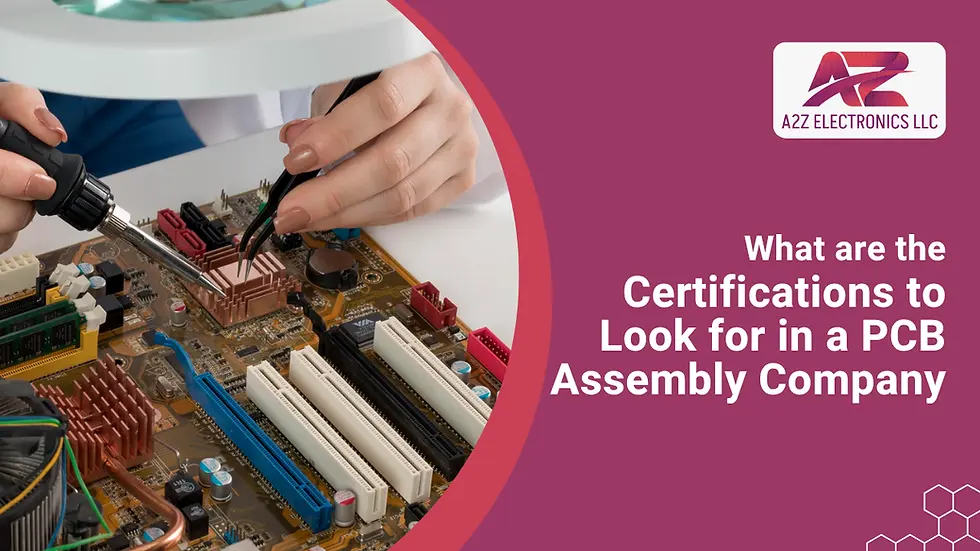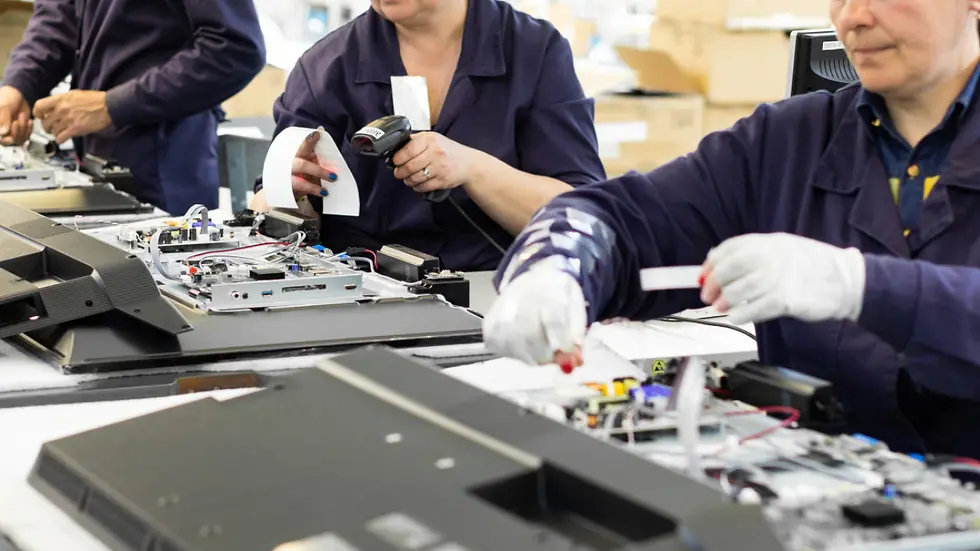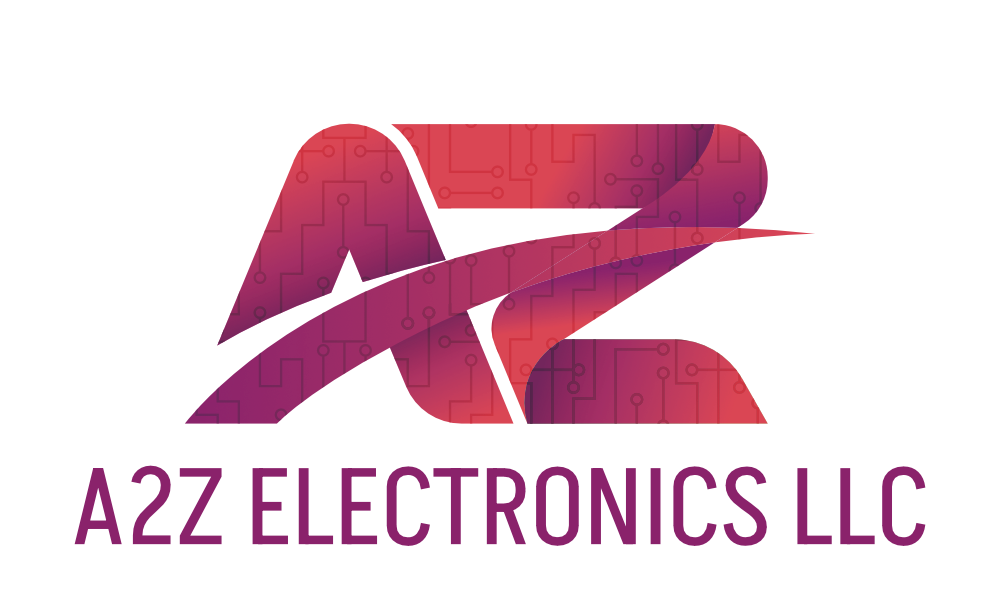What Are the Certifications to Look for in a PCB Assembly Company?
- Harshit Shah

- Aug 6, 2025
- 5 min read
Updated: Jan 3

Not all PCB assembly companies operate at the same level, and certifications help you see the difference. These credentials serve as proof that a manufacturer adheres to recognized processes, prioritizes quality, and can support products designed for demanding environments. If you’re planning to bring a product to market or need to meet regulatory standards, working with a partner that prioritizes the right PCB certifications makes the path smoother and far less risky.
In this blog, we’ll explain which certifications truly matter, how they benefit your product, and what to expect from a reliable and certified PCB assembly service provider.
Table of Contents
Why Certifications Matter in PCB Assembly?
When a company builds printed circuit boards for commercial, medical, aerospace, or defense products, there’s a lot on the line. A single faulty connection or out-of-specification board can result in delays, financial loss, or even safety issues.
Certifications ensure that your manufacturing partner follows proper guidelines, works within audited systems, and delivers consistently high standards.
Certified PCB assembly services follow documented processes, offer traceability, and maintain full quality control—all of which help reduce risks during development and production. For industries where every detail matters, these certifications offer peace of mind.
Read more about the differences between a PCB and PCBA in our blog -PCB vs PCBA – What are the Differences and Why It Matters
Core Certifications Every PCB Assembly Company Should Have
Reliable PCB assembly companies share a common foundation: certifications that reflect their quality management practices, manufacturing discipline, and attention to safety.
Here are the most important ones to expect:
ISO 9001 – A standard for quality management systems that ensures a company’s internal processes are structured, reviewed, and continually improved.
IPC-A-610 – Sets visual and structural acceptance criteria for solder joints, assemblies, and workmanship. Especially valuable for Class 2 and Class 3 builds.
RoHS Compliance – Guarantees that the boards are free from restricted hazardous materials. This is increasingly important for environmental and export regulations.
These foundational PCB certifications demonstrate that the company can support a wide range of projects—from early prototypes to full-scale production—while maintaining consistency and control.
Interesting reads: Why Aerospace OEMs Need a Highly Reliable PCB Assembly Partner
Industry-Specific Certifications to Consider

If your application serves a specialized sector, it’s important to work with a PCB assembly company that understands and meets industry-specific requirements. Below are certifications tailored to more regulated fields:
ISO 13485
Required for medical device manufacturing & assembly. Focuses on documentation, traceability, and risk mitigation throughout the production process.
AS9100
Built for aerospace and defense manufacturing. It expands upon ISO 9001 by adding controls for safety, reliability, and compliance within highly regulated supply chains.
ITAR Registration
Enables the manufacturer to undertake and manage defense-related projects in compliance with U.S. government frameworks.
These certifications demonstrate that a manufacturer is qualified to build for demanding environments and adhere to the strict rules associated with these industries. If you’re working with a printed circuit assembly corporation on high-stakes designs, these credentials make a big difference.
Interesting read: Understanding Medical Device Regulations in PCB Assembly
What do These Certifications Mean for Your Product?
Certifications aren’t just about audits—they bring practical advantages to your product and your business:
Improved reliability
Certified processes help reduce assembly errors, resulting in better board performance and fewer field failures.
Better compliance
Documentation and process control simplify certification and approval when selling into regulated markets.
Streamlined communication
Certified manufacturers are more likely to have established systems for handling revisions, quality checks, and feedback loops.
Greater customer trust
Products built by certified facilities inspire more confidence during inspections and reviews.
In short, certification adds a layer of security that benefits the full product lifecycle—from prototyping to production and beyond.
Interesting reads: A Step-by-Step Guide to the PCB Assembly Process in Electronic Manufacturing
Why A2Z Electronics Is a Trusted, Certified PCB Assembly Partner?

At A2Z Electronics LLC, we take quality and compliance seriously. Our facility is fully ISO-certified and equipped to handle high-reliability applications. We currently hold ISO 13485 certification for medical devices, and we are preparing for AS9100 to serve aerospace and defense customers more effectively.
What we offer:
End-to-end PCB assembly services with clear documentation and traceability
In-house teams trained to follow IPC and industry-standard practices
A transparent, responsive approach to project management
Fast lead times without compromising on quality
As a trusted partner for PCB assembly in USA, we work with startups, OEMs, and contract developers to deliver boards that are built right the first time.
Final Thoughts
Working with a certified PCB assembly company gives you more than just process validation—it gives you confidence. From standard PCB assembly services to highly regulated sectors, the right certifications help you reduce risks, avoid costly rework, and meet performance expectations.
At A2Z Electronics LLC, we believe every board deserves the same attention to quality, because your success depends on it. Get in touch with us to discuss your business requirements.
FAQs
1. Is ISO 9001 enough for a PCB assembly company?
ISO 9001 is a strong starting point—it shows that a PCB assembly company has a structured quality management system in place. However, it may not be sufficient on its own for projects in regulated industries. Fields like medical, aerospace, and defense often require additional certifications like ISO 13485, AS9100, or ITAR registration to meet their strict compliance and traceability needs.
2. Why does IPC-A-610 matter in PCB Assemblies?
IPC-A-610 sets the industry benchmark for workmanship and visual inspection of electronic assemblies. It defines the acceptable quality level for solder joints, component placement, and cleanliness. When a PCB assembly company follows this standard, it helps ensure consistency, reduces defects, and aligns the final product with customer expectations—especially important for Class 2 and Class 3 builds.
3. What certifications should a PCB assembly company have for aerospace & medical?
For aerospace applications, AS9100 is typically required, as it addresses quality, safety, and documentation specific to the aviation and defense sectors. For medical device manufacturing, ISO 13485 is essential. It focuses on product traceability, risk management, and regulatory alignment. A company certified in these standards is better prepared to support highly regulated projects.
4. Can an EMS company handle FDA compliance without ISO 13485?
Technically, an EMS provider can support FDA-regulated projects, but ISO 13485 certification significantly improves that capability. Without it, demonstrating compliance with FDA requirements becomes more complex and less reliable. Manufacturers building for the medical field are better off working with a partner that has ISO 13485, as it aligns directly with FDA expectations for documentation and quality systems.
5. What is the IPC standard for PCB assembly?
The most widely referenced IPC standard for PCB assembly is IPC-A-610, which outlines the acceptability criteria for electronic assemblies. For soldering processes, IPC J-STD-001 is also important, as it defines soldering quality requirements. These standards help ensure boards are built consistently and meet industry expectations for performance and reliability.






